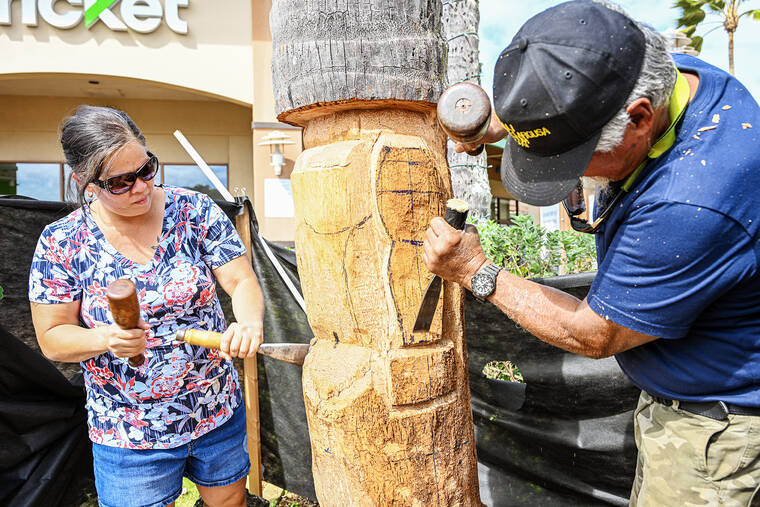LIHU‘E — The tapping sounds and rhythm emanating from behind dust screens at Kukui Grove Center on Monday was likened to the sound of woodpeckers atop trees.
“You got to come,” said Laurie Ho, president of the Kaua‘i County Farm Bureau and a key figure at the weekly Pau Hana Market that was taking place at Kukui Grove. “The dead coconut tree is being upcycled (carved).”
Cholena Bray and her Kumu Kamakana Bray of the Kaua‘i Maoli Woodcarving Academy were the source of the tapping, as the pair worked to transform the lifeless coconut tree trunk into a tiki over the span of several weeks.
“We couldn’t come for a while because Cholena’s kids were sick,” Kumu Kamakana said. “They’re better now, and today is a holiday so we took advantage of the extra time to get some work done.”
Working under Kumu Ka‘eo Bradford, the Brays were also present during the Ola Ka‘I Kaua‘i-Ni‘ihau event celebrating February as Mahina ‘Olelo Hawai‘i month, but were distracted because Cholena had her children participating in the program, and Kumu Kamakana had his haumana, or students, demonstrating wood carving and techniques in working with different wood.
“I was lucky if I got 10 hits in all day,” Kumu Kamakana said. “I always let the haumana do all the carving.”
The project started when the Kukui Grove management team sought a wood carver to produce a tiki from the dead coconut tree that was a casualty of the winds during the holiday season. According to Operations Manager Josh Pajela, the wind snapped the tree’s trunk and caused it to die.
“We had another tree get snapped in a different part of the shopping center,” Pajela said. “Fortunately, that tree recovered.”
Kumu Kamakana said the eventual product will be a likeness of Lono, the Hawaiian diety that is honored during the makahiki period that is considered the “ancient Hawaiian New Year” by National Park Service signage on Maui. The signage states the festival starts when the star cluster Makali‘i (Pleiades, or Seven Sisters) rises over the horizon in Hawai‘i at sunset. This period falls around late October or early November, and lasts for four months.
“The project’s name is ‘Lono-i-ki‘eke,’ or translated to mean ‘Lono of provision,’” Kumu Kamakana said. “That’s because we are at Kukui Grove where people come for provisions (whether physical goods or knowledge).”



